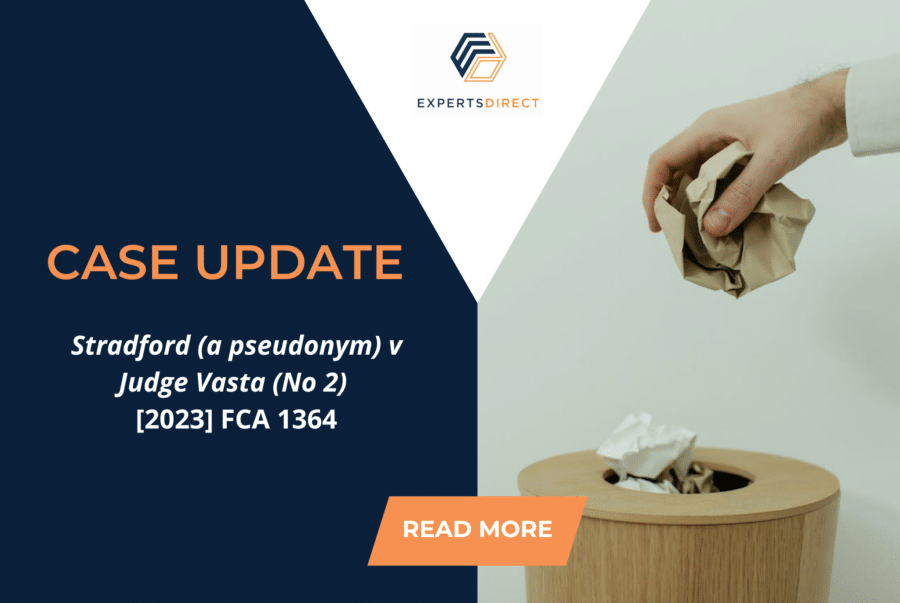Stradford (a pseudonym) v Judge Vasta (No 2) [2023] FCA 1364
In this “unique and unusual” case, the court weighed in on whether a party must pay costs for abandoned expert evidence, and whether the other party must pay costs for their expert evidence in response to the abandoned evidence.
Background
The applicant was falsely imprisoned, and sought an award of general and aggravated damages for deprivation of liability. In Stradford (a pseudonym) v Judge Vasta [2023] FCA 1020, the court found the applicant was entitled to a sizable award of damages. The matter was then relisted to hear arguments as to an appropriate costs order.
Expert evidence
The applicant was ordered to be compensated for psychiatric injury and associated loss of earning capacity. In support of his economic loss claim, the applicant called an expert accountant, Ms JB, who gave opinion evidence by calculating the economic loss based on certain instructions and assumptions concerning the applicant’s past and anticipated future earnings. The figure for economic loss calculated based on those instructions and assumptions was “very large”.
The Commonwealth called its own expert, Mr SB, who adopted a similar methodology to Ms JB, but came up with a significantly lower figure, primarily because Mr SB’s instructions, assumptions, or opinions in respect of the applicant’s past and anticipated future earnings were different to those employed by Ms JB.
The court found that Ms JB’s instructions and assumptions concerning the applicant’s past earnings turned out to be unsupported by, if not contrary to, the evidence adduced at trial. The court said that Ms JB’s unquestioning and unfailing acceptance of the reliability and integrity of some of the information and assumptions upon which she relied left a lot to be desired. [14]
In final submissions, the applicant effectively abandoned any reliance on Ms JB’s reports and evidence. He proceeded to proffer a significantly lower figure for his economic loss based on entirely different figures for his past and anticipated future income.
Ultimately, Wigney J did not accept the evidence of either Ms JB or Mr SB in respect of the applicant’s economic loss, mainly because the inputs they fed into their formula for calculating the loss, primarily those in respect of past and anticipated future earnings, were based almost entirely on instructions and assumptions and, in some respects, differences of opinion. Instead, the Court awarded the applicant $50,000 in respect of future economic loss as a buffer.
The respondents argued that they should not be required to pay the costs associated with Ms JB’s evidence because the applicant eventually abandoned any reliance on it. They also contended that the applicant should pay the costs associated with Mr SB’s evidence as it was responsive to Ms JB’s evidence.
As to Ms JB’s costs, the court did not consider it just and equitable to require the respondents to pay the costs of Ms JB’s reports and her attendance at court in all the circumstances.
Ms JB’s evidence was abandoned, and would have been rejected, because the applicant provided the expert with wholly incorrect and unreliable information and assumptions. According to the court, the abandonment of an expert report during the trial, or in final submissions, is essentially no different to obtaining an expert report but not tendering it at trial. A party could scarcely expect to be entitled to obtain the costs associated with an expert report which was never relied on or tendered at trial. [35]
Still, Wigney J did not consider that the applicant’s conduct was sufficiently unreasonable to disentitle him to all the costs associated with Ms JB’s evidence. The carve out from the costs order was limited to the amount paid to Ms JB for the preparation of her expert reports and her court attendance. [36]
As to whether the applicant should be required to pay costs associated with Mr SB’s evidence, the court said that while Mr SB’s evidence was largely responsive to Ms JB’s evidence, it did not contain a critique of her report. Mr SB had also arrived at his own calculation of the economic loss based on different instructions, assumptions, and opinions regarding the applicant’s past and anticipated future income, which the court ultimately rejected. [22]
Wigney J held that respondents did not necessarily need to file an expert report in response to Ms JB’s report, and could have instead made the forensic decision to challenge the instructions and assumptions underlying Ms JB’s report. [23]
The court rejected the contention that the applicant should pay the respondent’s costs associated with Mr SB’s evidence.
Key takeaways
- Instructions and assumptions given to the expert must be supported by other evidence to be adduced at trial.
- The costs of an expert report which is ultimately never relied on or tendered at trial are unlikely to be recoverable if the party adducing that expert evidence is ultimately successful at trial.
- The abandonment of expert evidence by one party will not necessarily entitle the opposing party to recover its costs for expert evidence put on in reply to the evidence of the first expert.
Read the full decision here.
